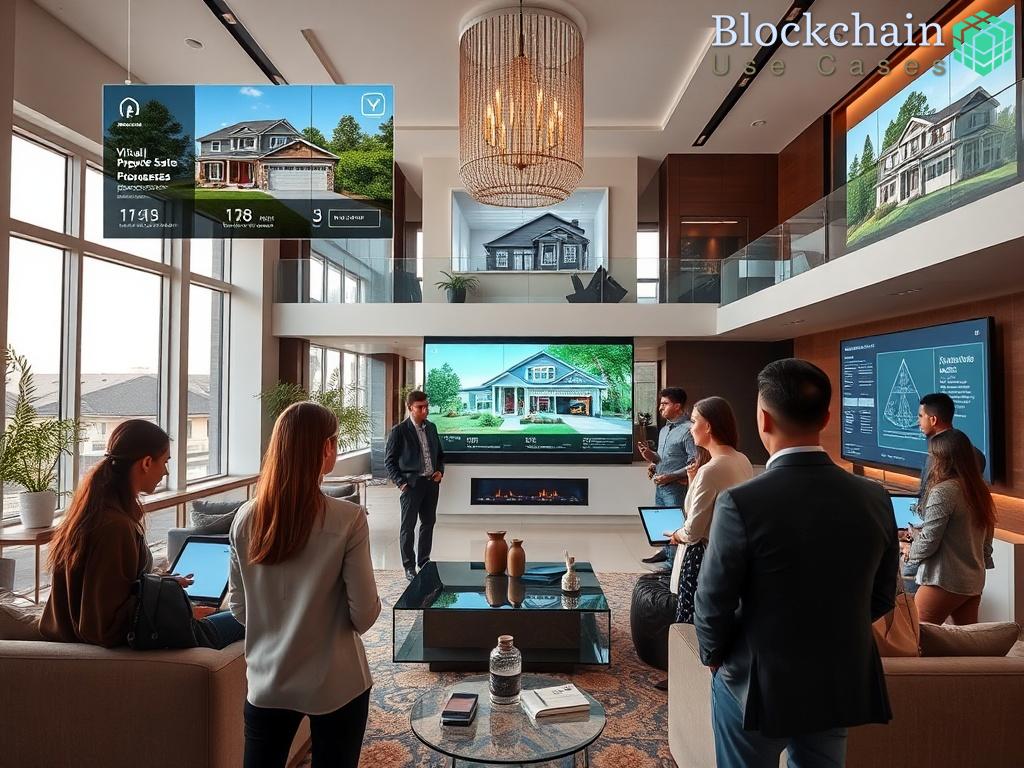Streamlining Property Listings with Blockchain
Revolutionizing Real Estate Transactions
The real estate industry has long been plagued by inefficiencies and lack of transparency. Traditional property listings can be cumbersome, often requiring multiple intermediaries to facilitate transactions. Enter blockchain technology, a revolutionary tool that promises to streamline property listings and enhance the overall experience for both buyers and sellers. By leveraging the immutable and decentralized nature of blockchain, the real estate market can transform the way properties are showcased and sold.
Enhancing Transparency and Trust
One of the fundamental advantages of using blockchain in real estate is the enhancement of transparency. Every transaction recorded on the blockchain is visible to all parties involved, reducing the risk of fraud and misrepresentation. This is particularly crucial during property showings and open houses, where potential buyers seek assurance of authenticity. With blockchain, buyers can access verified property histories, ownership records, and transaction details, fostering trust in the process.
Key Benefits of Blockchain in Property Listings
Adopting blockchain technology in real estate property listings brings forth numerous benefits that can significantly impact the industry. Here’s a look at some of these advantages:
- Reduced Transaction Costs: By minimizing the need for intermediaries, blockchain can lower transaction fees associated with property sales.
- Faster Transactions: With smart contracts, transactions can be executed instantly, dramatically speeding up the buying process.
- Increased Accessibility: Blockchain allows for decentralized listings, making it easier for buyers to access and explore properties from anywhere in the world.
- Enhanced Security: Blockchain’s cryptographic features ensure that sensitive information related to property transactions is kept secure and private.
Future Outlook: The Integration of Blockchain in Real Estate
As the real estate sector continues to evolve, the integration of blockchain technology presents an exciting future. Real estate companies that embrace this innovation are likely to gain a competitive edge, attracting tech-savvy buyers and sellers looking for a more efficient and trustworthy transaction process. The potential to redefine how properties are listed and sold is immense, positioning blockchain as a game-changer in the real estate market.
Enhancing Security and Transparency in Showings
The integration of blockchain technology into real estate property showings and open houses provides a transformative approach to security and transparency. As potential buyers traverse through various properties, the assurance of a secure and transparent environment is paramount. Blockchain offers an innovative solution to bolster these critical aspects, ensuring that both sellers and buyers can engage in a trustworthy exchange.
Building Trust Through Immutable Records
One of the most significant advantages of blockchain in property showings is the creation of immutable records. Each property listing, along with its associated data—such as ownership history and transaction timelines—can be recorded on the blockchain. This feature guarantees that information cannot be altered or tampered with, providing a reliable source for all parties involved. As a result, buyers can conduct due diligence with confidence, knowing that the information they access reflects the true status of the property.
Eliminating Fraud Risks
The real estate sector has often been a target for fraudulent practices, particularly in property showings. Blockchain technology addresses this issue head-on by establishing secure digital identities for properties and their owners. This reduces the likelihood of fraudulent listings and ensures that buyers are interacting with legitimate representatives. The use of digital signatures further enhances this security, allowing for authenticated interactions during showings.
Key Features of Blockchain for Secure Showings
The implementation of blockchain technology in property showings introduces several key features that enhance security and transparency:
- Decentralized Verification: Property details are verified through a decentralized network, minimizing reliance on a single source and reducing the potential for misinformation.
- Smart Contracts: Automated contracts execute transactions and agreements, ensuring that terms are met before any exchange takes place, thereby safeguarding both parties.
- Real-Time Updates: All changes to property status or ownership are updated in real-time on the blockchain, providing buyers with the most current information during their search.
Incorporating these features leads to a more secure and transparent environment for property showings, ultimately enhancing the overall experience for prospective buyers. As the real estate industry continues to adapt to technological advancements, blockchain stands out as a pivotal innovation that addresses age-old challenges, paving the way for a more efficient marketplace.
Virtual Tours and Blockchain Integration
As technology advances, the real estate industry is witnessing a significant transformation, particularly with the rise of virtual tours. These immersive experiences allow potential buyers to explore properties from the comfort of their homes, breaking geographical barriers. Integrating blockchain technology into virtual tours not only enhances the viewing experience but also adds layers of security and transparency, ensuring that both buyers and sellers can engage with confidence.
Enhancing the Virtual Tour Experience with Blockchain
Virtual tours have become a staple in real estate marketing, providing an engaging platform for showcasing properties. However, the inclusion of blockchain technology elevates these tours to a new level. By embedding blockchain within the virtual tour framework, sellers can provide verified information about the property, such as ownership history and maintenance records. This integration ensures that potential buyers are accessing accurate, unaltered data during their virtual walkthroughs, fostering trust and reducing the likelihood of misinformation.
Furthermore, blockchain’s decentralized nature allows for the creation of a secure digital ledger that logs every interaction throughout the virtual tour process. This means that buyers can have access to a transparent history of who has viewed the property, along with any feedback or inquiries made. Such features empower buyers to make informed decisions based on a comprehensive understanding of the property’s interest level and potential value.
Security and Authenticity: The Blockchain Advantage
In an era where digital fraud is a growing concern, ensuring the authenticity of property listings is paramount. Blockchain technology addresses this issue by establishing a secure and verifiable environment for virtual tours. Each property can have its unique digital identity, represented by a token on the blockchain, which encapsulates all relevant information and documentation. This digital identity serves as a safeguard against impersonation and fraudulent listings, providing buyers with peace of mind as they engage in virtual explorations.
Additionally, the use of smart contracts can automate the scheduling and execution of virtual tours. When a buyer books a tour, the smart contract can ensure that all necessary conditions are met, such as confirming the availability of the property for viewing. This not only streamlines the process but also reinforces the integrity of the transaction, as all agreements are recorded and executed on the blockchain.
A New Era for Property Showings
The fusion of virtual tours and blockchain technology signifies a new era in property showings. As consumers become more accustomed to digital experiences, the real estate industry must adapt by providing innovative solutions that meet their expectations. The integration of blockchain into virtual tours not only enhances security and transparency but also revolutionizes how properties are marketed and sold. In this evolving landscape, buyers and sellers alike can benefit from a more efficient, trustworthy, and engaging real estate experience.
Smart Contracts for Open House Transactions
In the rapidly evolving landscape of real estate, smart contracts are emerging as a transformative force, especially in the context of open house transactions. By automating various aspects of the buying process, these digital agreements provide both buyers and sellers with a level of efficiency and security previously unattainable. The integration of smart contracts into property showings is not merely a trend; it’s a fundamental shift that enhances trust and streamlines operations.
Smart contracts are self-executing contracts where the terms are directly written into code on the blockchain. This technological advancement eliminates the need for intermediaries, such as agents or brokers, by automating tasks such as payment processing and document verification. Imagine a prospective buyer attending an open house, where they can engage directly with the smart contract that governs the transaction. This not only expedites the process but also ensures that all parties are held accountable for their obligations.
Real-Time Execution and Accountability
The real power of smart contracts lies in their ability to execute transactions in real-time. When a buyer decides to make an offer during an open house, the smart contract can automatically trigger a series of actions. For example, once the buyer submits their offer, the contract verifies the buyer’s financial capacity and ensures all necessary documents are in place before finalizing the transaction. This immediate execution reduces the waiting period typically associated with real estate transactions, allowing buyers to move quickly in a competitive market.
Moreover, the transparency provided by blockchain technology means that all actions taken within the open house transaction are recorded and accessible to relevant parties. This level of visibility fosters a culture of accountability, minimizing disputes and misunderstandings that can arise in traditional real estate dealings. Buyers can rest assured that what they see during an open house is accurately represented and that the seller is legally bound to the terms agreed upon.
Revolutionizing Buyer-Seller Interactions
Another significant advantage of implementing smart contracts in open house transactions is the revolution in interactions between buyers and sellers. With traditional methods, communication often relies on various parties, leading to potential miscommunications and delays. Smart contracts streamline this by providing a direct channel for both parties to interact in a secure environment.
Additionally, the automation of processes such as scheduling follow-up showings or negotiating terms can be incorporated into the smart contract framework. For instance, if a buyer wishes to schedule a second visit or request additional information, the contract can facilitate this seamlessly. This direct interaction not only enhances the experience for buyers but also empowers sellers by putting them in control of their property’s presentation and sale.
As the real estate industry embraces blockchain technology and smart contracts, the potential for a more efficient, transparent, and user-friendly experience is becoming increasingly apparent. The future of open house transactions is bright, with smart contracts leading the way towards a more innovative marketplace.
Data Ownership and Privacy in Real Estate
As the real estate landscape evolves with technological advancements, the integration of blockchain technology is reshaping the conversation around data ownership and privacy. In an industry where sensitive information is exchanged routinely, ensuring that both buyers and sellers maintain control over their data is paramount. Blockchain not only enhances transparency but also provides a robust framework for protecting personal information, thereby fostering a trusted environment for all parties involved.
Ownership of Data: A New Paradigm
Traditionally, real estate agents and brokers have held significant sway over property data, often leading to concerns regarding its accuracy and accessibility. Blockchain disrupts this model by decentralizing data storage and granting ownership back to individuals. Each participant in the transaction holds their own verified data, securely stored on the blockchain, which can be shared selectively with relevant parties. This shift empowers sellers to present their properties with confidence while allowing buyers to verify information through a transparent, immutable ledger.
Privacy Concerns Addressed
With the rise of digital transactions, privacy concerns have surged, especially in real estate where financial details and personal information are at stake. Blockchain technology addresses these concerns through its inherent cryptographic capabilities. By encrypting sensitive information, blockchain ensures that data is only accessible to authorized parties. Buyers can engage in property showings with the assurance that their personal information remains confidential, while sellers can confidently share their property history without the risk of exposure to unauthorized entities.
Moreover, the implementation of smart contracts further enhances privacy by automating interactions without compromising personal data. For instance, when a buyer expresses interest in a property during an open house, their information can be securely transmitted to the seller’s smart contract without revealing unnecessary details. This method not only expedites the transaction but also maintains a high level of privacy for all involved.
| Data Control Aspect | Traditional Model | Blockchain Model |
|---|---|---|
| Data Ownership | Held by agents/brokers | Owned by individuals |
| Data Sharing | Limited access, often inaccurate | Selective, verified sharing |
| Privacy Control | High risk of exposure | Encrypted, secure transactions |
As real estate continues to embrace blockchain technology, the emphasis on data ownership and privacy will only grow. This innovative approach not only enhances trust among participants but also cultivates an environment where buyers and sellers can engage confidently, knowing their information is secure. The future of real estate transactions is not just about efficiency; it is also about safeguarding the privacy and rights of individuals in a digital age.





